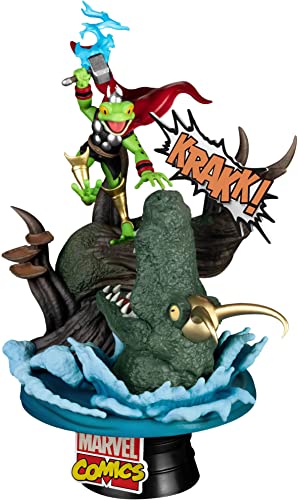“Alan Moore has earned his frustration, his suspicions and his occasional flashes of anger. He should be listened to and learned from, not dismissed and certainly never mocked.” — Tom Spurgeon
When the comic book industry first coalesced in the late 1930s, it adopted a business model that, to put it lightly, did not put an emphasis on ethical behavior. These were publishing companies run by greedy, exploitive people who had_questionable connections to gangsters or had been indicted for mail fraud. They cared little about the quality of their product, the well-being of their workers–sorry, freelancers–or seeing that anyone who contributed to their success was fairly and duly compensated.
Here we are, roughly 80 years later, and everything has changed. Whoops, I’m sorry. I mean nothing has changed. It’s still an ugly, cutthroat industry where publishers are all too happy to grab as many rights as they can to artists’ hard-won work whenever said artists are willing to take those sucker bets. It’s an industry dominated by cynical publishing ventures and easy cash grabs rather than an interest in creating long range, sustainable business models. Perhaps the worst thing about our current era is that those who have legitimate reason to complain about their mistreatment are the ones most frequently shouted down by a certain cross-section of their fans, a mercenary bunch who seem to care more for ensuring that they never, ever lose the chance to get more of the same in a timely fashion than if the people producing that same are treated with a certain amount of decency and respect.
Of course, it wasn’t supposed to be that way. The comics boom of the 1980s that gave rise to the indie, b&w movement also gave rise to a vigorous interest in creators rights. People like Alan Moore, Dave Sim, Steve Bissette, Scott McCloud, Neal Adams and Frank Miller saw what had happened to industry veterans like Jack Kirby and_Steve Gerber, and were justifiably outraged. They spoke out against these perceived injustices and continually pushed for better compensation and to have a greater stake in the comics they produced, whether on their own or with a major publisher. The creator-owned works we see from companies like Dark Horse and Vertigo, the royalties that current artists and writers receive on work-for-hire projects — that’s all a direct result of these efforts.
Watchmen was supposed to be a part of that movement. As Moore states in a 2005 interview with Heidi MacDonald, the idea was that by creating characters out of whole cloth rather than relying on the Charlton bunch, Moore and Gibbons would be given the rights to Watchmen (and also V for Vendetta, which Moore handed over to DC in order to finish the project) one year after they went out of print, which they expected to happen as soon as the series was completed. To my knowledge, DC has never disputed Moore’s description of events.
Of course, we know how that turned out. Watchmen caught the rising winds of the burgeoning graphic novel movement and ended up never going out of print. Moore and Gibbons found themselves to be victims of their own success as the book continued to rise in popularity and acclaim, and readers found they preferred reading it in collected trade form to hunting down back issues. It was, as Eric Stephenson, notes, a “dirty deal,” and if it was a turn of events DC didn’t necessarily expect, well, it’s not like they’ve done much to create a more equitable situation in the years since.
You see, whether or not Before Watchmen dilutes the charm of the original comic is_irrelevant — creators are just as capable of destroying the goodwill their initial work establishes as easily as corporations are.
And the fact that Moore has frequently drawn upon classic literary material in works like Lost Girls and League of Extraordinary Gentlemen is also_irrelevant_(although let me make an aside here to say that there’s a big difference between building a pastiche using familiar characters and motifs to create something new and original, and rehashing familiar material to make a quick and cynical cash grab). The basic issue here is one of fairness, of creators rights and how this industry operates. It’s about how a work that should have been a shining example of how much had changed in the comics world instead became an example of how everything has stayed the same.
Now, I am a full-time reporter for a daily newspaper. Everything I write for that newspaper is work-for-hire, including the comics column I did for them for a few years. I was not compensated, for example, when an interview I did with Alan Moore was reprinted in the book_Alan Moore: Conversations, nor did I expect to receive any compensation, financial or otherwise._On the other hand, I get a weekly salary for my efforts. I get sick days and vacation. I get health care and a 401k plan. I get treated like a valued employee. Moore doesn’t get and never has received any of those things. Yes, his work has been financially successful enough to make some of those compensations moot, but there are very few creators working in this industry_that can make similar claims.
If we care at all about the comics industry, if we care about comics as an art form, if we want it to be taken seriously, if we want to see talented people produce quality material, then we need to start caring about the way those people are treated in this industry. We need to start valuing creators rights over our own greedy need for more third-rate pulp. We need to stop making shameless, defensive rationalizations and questioning people’s motives when the basic motive underlying those outbursts is “me wanty.” We need to stop acting like petulant, entitled children. And we need to speak out when creators whose work we claim to value and enjoy are given short shrift in the name of the_Almighty_dollar.
https://robot6.comicbookresources.c...o-far-on-before-watchmen-and-creators-rights/


















